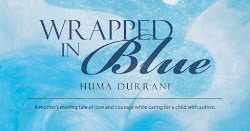 |
| Dany's emotions |
The other day I and was unexpectedly blown away by Dany’s response to his art work on emotions. Dany is an 8 year old and is autistic. His natural inclination is to draw detailed skyscrapers with elevators using lead pencil but upon my directive that day he painted an abstract image depicting his emotions and uttering the following sentences as he applied paint in circular motion to the surface of the paper:
“Emotions need to stick together. Emotions are a team, sadness and anger and happiness and fear make two teams”.
“Anger protects sadness”.
“Seriousness surrounds everything”.
“Emotions must be careful”.
“Emotions need to stick together. Emotions are a team, sadness and anger and happiness and fear make two teams”.
“Anger protects sadness”.
“Seriousness surrounds everything”.
“Emotions must be careful”.
This sort of insight from an 8 years old on the spectrum was mind blowing indeed! Were his comments a learned response, a coincidence or some superficial knowledge that he had acquired from somewhere?
I found my answer through the astute minds of the following:
Paul Kalinithi, a brilliant neuroscientist with a keen intellect, while reflecting upon his mortality in his memoir ‘When Breath Becomes Air’, underscores the structural and functional intricacy of our cerebral matter, whereas Steve Silberman in ‘Neurotribes. The Legacy of Autism and Future of Neurodiversity’ highlights the diversity of the human brain in his book by recapitulating the history of autism through the past century. However, it is Temple Grandin who provides the most fascinating insight into its extreme complexity in 'The Autistic Brain' from the perspective of a scientist as well as a neurodiverse individual or simply the most famous autistic person alive.
Paul Kalinithi, a brilliant neuroscientist with a keen intellect, while reflecting upon his mortality in his memoir ‘When Breath Becomes Air’, underscores the structural and functional intricacy of our cerebral matter, whereas Steve Silberman in ‘Neurotribes. The Legacy of Autism and Future of Neurodiversity’ highlights the diversity of the human brain in his book by recapitulating the history of autism through the past century. However, it is Temple Grandin who provides the most fascinating insight into its extreme complexity in 'The Autistic Brain' from the perspective of a scientist as well as a neurodiverse individual or simply the most famous autistic person alive.
According to Grandin, “what’s in my autistic brain is not necessarily what is in someone else’s autistic brain”. Yet she adds that individuals with autism are grouped under a cluster of symptoms that are described by specialists who are not on the spectrum themselves. This labelling which has gone through many modifications in the Diagnostic and Statistical Manual of Mental Disorders or DSM, though necessary on many fronts can be conversely detrimental to the individual with autism.
Labelling is important when the question of accessibility to therapies, insurance claims and statements arises. It loses value when we fail to see the individual as an entity with unique potential. We do this automatically without realising that it can be harmful for the prognosis of the subject in question.
For instance, there have been cases where a mute child is considered profoundly retarded but one day starts typing in sentences or an uncontrollable, tantruming, non-verbal one who ends up writing a book.
So then was Dany like Tito (the boy who Grandin talks about in her book) who experienced his reality in two parts “an acting self” where he was perceived as intellectually disabled because he could not talk and would run around the room flapping his arms or “a thinking self” someone “ filled with learnings and feelings” who published several books after his mother tied a pen to his hand so he could write?
Thanks to the three books that gave me my answers, I learned an important lesson: never to underestimate the potential of the human brain.

